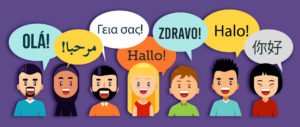Can Translation bring Social Change?
Translation is the process of conveying meaning from one language to another. It is a crucial tool for communication, allowing individuals and communities to share information and ideas across linguistic and cultural barriers. In recent years, translation has gained recognition as a powerful tool for promoting social justice, human rights, and activism. This blog will explore the role of translation in promoting social change, highlighting its potential to make a significant impact in the world.

Tool for promoting social justice
Translation is a vital tool for promoting social justice. It allows individuals and communities to access information and resources that may not be available in their native language. In today’s interconnected world, information is power, and the ability to access information can be the difference between success and failure. For example, access to legal information in one’s native language is critical for ensuring fair treatment under the law.
Without translation, individuals who do not speak the language of the legal system may struggle to understand their rights, navigate the legal process, and access justice. Translation can help to level the playing field, ensuring that everyone has access to the same information and resources, regardless of their language or cultural background.
Translation can also be used as a tool for promoting human rights. Human rights are universal, but they are often enshrined in laws and documents that are written in specific languages. Translation can help to ensure that these laws and documents are accessible to everyone, regardless of their language or cultural background. For example, the Universal Declaration of Human Rights is available in over 500 languages, making it accessible to people all over the world. Translation can help to ensure that human rights are respected and upheld, regardless of where a person lives or what language they speak.
Significant role in promoting
Translation can also play a significant role in promoting activism. Activism is about creating change, and communication is a crucial part of that process. Translation can help to bridge the gap between different communities and cultures, allowing activists to share their message with a wider audience. It can also help to build solidarity between different groups, allowing them to work together towards a common goal. For example, translation can help to amplify the voices of indigenous communities who are fighting for their land and cultural rights. It can also help to bring attention to social justice issues that may be overlooked by mainstream media, such as the struggle for LGBTQ+ rights in countries where homosexuality is illegal.
Translation can also help to promote cultural exchange and understanding. In today’s globalized world, cultural exchange is more important than ever. Translation can help to facilitate this exchange by allowing individuals and communities to share their culture and ideas with others. This can help to break down stereotypes and promote understanding between different cultures. For example, translation can help to promote international literature, allowing readers to explore the rich cultural heritage of different countries and languages.
However, translation is not without its challenges. Translators must navigate the nuances of language and culture, ensuring that the meaning of the original text is accurately conveyed in the translation. This can be particularly challenging when translating documents that are steeped in cultural or historical context, such as legal documents or religious texts. Translators must also be sensitive to the cultural and political implications of their translations, ensuring that they do not inadvertently perpetuate stereotypes or perpetuate oppression.
To address these challenges, translators must receive adequate training and support. This includes language training, cultural sensitivity training, and ongoing professional development. Translators must also have access to resources and support networks, such as online forums and mentorship programs. Finally, translators must be adequately compensated for their work, recognizing the valuable role they play in promoting social change.
In conclusion, translation is a powerful tool for promoting social justice, human rights, and activism. It allows individuals and communities to access information and resources that may not be available in their native language, ensuring that everyone has access to the same opportunities and resources.
Speakthylanguage is a language service provider working for more than 2 decades & offers professional translation services in 80 languages. Whether you need to translate a document, website, or video, Speakthylanguage has the expertise and resources to help you communicate effectively with your global audience.
In addition to translation services, Speakthylanguage also specializes in creating and managing multilingual websites. By translating your website content into multiple languages, you can reach customers from all over the world and provide them with a seamless online experience.
At Speakthylanguage, we are committed to delivering high-quality translations that are accurate, culturally appropriate, and tailored to your specific needs. Contact us today to learn more about our services and how we can assist you with your language needs.
Email us at: info@speakthylanguage.com





